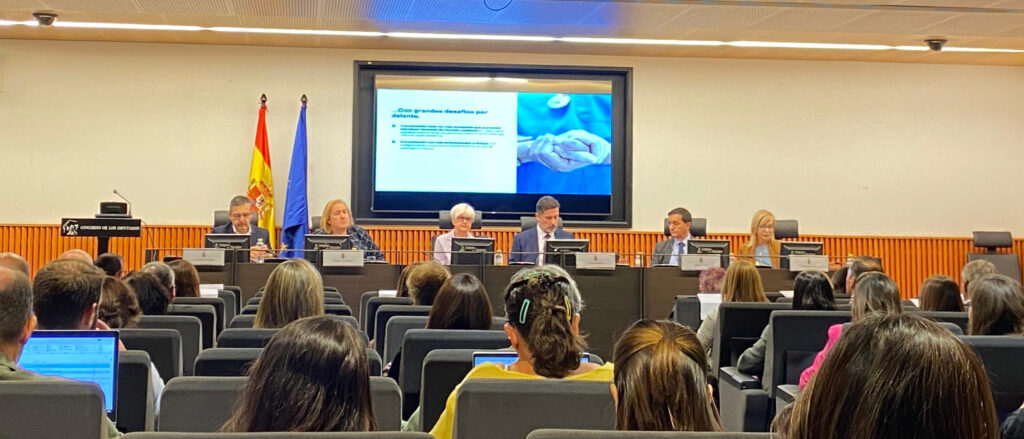
By: Natalia Pérez Mas, Account Executive and Social Media Manager.
.
This Monday, in the National Parliament, we attended the debate on the future of the National Health System (NHS) and the main challenges it faces, which brought together representatives of doctors, nurses, patients and pharmacists. Dr. Virginia Izura Azanza, Deputy Secretary of the Official College of Doctors (CGCOM), demanded maximum excellence in healthcare management; something essential and which should be mandatory for the better functioning of the system and the correct assessment of healthcare innovations of interest that strengthen the NHS. Dr. Diego Ayuso, Head of the General Council of Nurses, and Ms. Marta Galipienzo, vice-president of the General Council of Official Associations of Pharmacists (CGCOF), also took part. On behalf of the patients’ collective, the president of the Spanish Patients’ Forum, Mr. Andoni Lorenzo, presented the opportunity to change the healthcare model to one focused more on early diagnosis with the advances of new technologies. This is a vital concept that all healthcare policies must have, since the inevitable increase in the ageing of the population can only be dealt from a positive perspective by acting before the onset of disease. Furthermore, as the patients’ representative also insisted, it should be the Ministry of Health that leads this change of perspective and that the healthcare technology industry, as well as healthcare professionals and patients, should be constantly included in the decision-making process that influences the future of the National Health System.

From the legislator’s perspective, the second round table of the day brought together representatives of the political parties most represented in Parliament. They all agreed on the idea of Mr. Agustín Santos, president of the Health Committee and health spokesperson for SUMAR (junior partner of the coalition government): the main challenges facing the NHS are the inclusion of digitalization and AI. For this, it is necessary to increase healthcare spending within the GDP which, if it is currently at 7%, should go beyond 10% for Spain to reach the figures of other European benchmark countries such as Germany or France. Vox’s spokesman for Health, Mr. David García, added that his group is committed to creating a Big Data and AI network to improve the quality of the healthcare system. This would deploy many capacities still to be developed of the NHS, however, a fundamental issue in this is the treatment of healthcare data, which has been put on many occasions at the center of the main problems of this digitization process. For the Popular Party, the second vice-president of the Health Committee, Ms. Elvira Velasco, and Ms. María Sainz, for the Socialist Party, insisted on a correct reformulation of territorial financing for healthcare.
The Deputy Secretary of the Ministry of Health, Ms. Ana María Sánchez, closed the day and reported on the Ministry of Health’s Government Plan for this legislature based on four axes and with more than 250 actions. These axes range from recovering pride in public healthcare, with the fight against corruption as the basis; the adaptation of the NHS to new technologies, the expansion of services covered under the NHS and the reorganization of the Ministry to respond to healthcare crises. It is expected that these actions will also include specific measures to guide the correct treatment of healthcare data, which today, from Europe, is also one of the main areas that are being regulated with the new European Healthcare Data Space.

In short, all the national authorities have largely the same objectives for the future of the NHS, which are based on taking advantage of new technologies; all that is needed is to reach a clear consensus and tend towards a more efficient distribution of resources. This will make it possible to offer the latest healthcare advances to patients within the NHS, which must continue to grow and improve. From InFluenceSpain, we are committed to this positive evolution of the Spanish healthcare system, so we work with leading companies in health technologies in order to expand the health offer and advance in early diagnostics, increasingly essential to ensure quality treatments in one of the countries with the highest life expectancy.
.
For more information, join our social media profiles on X and LinkedIn.

